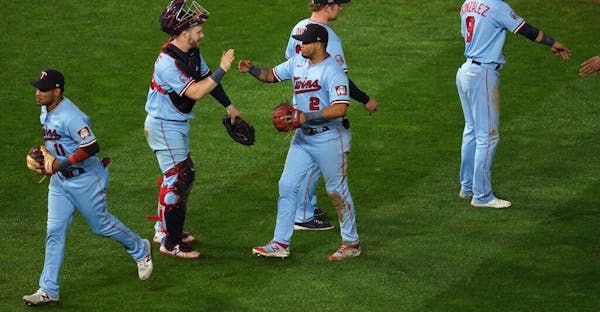 See
more of the story
See
more of the story
CHICAGO – Long-standing baseball tradition mandates that one mustn't overreact, either way, to a singular game, especially Game 1. Does that same logic apply if one game during a pandemic season equates to a little more than 2.5 times the normal currency in a 162-game season?
Not exactly.
Besides, a familiar theme emerged on Opening Day of the strangest season in the 60 years of the Twins' existence that allows for one definitive statement that promises to hold up.
The Twins can still hit. Surprise!
Bomba Squad 2.0 has been activated. Luis Arraez still hits everything.
Same old, same old.
Everything else about Friday's 10-5 win over the White Sox in MLB's Sprint-to-60 felt as strange as imagined, highlighted by the lack of crowd noise inside Guaranteed Rate Field and cardboard cutouts populating seats behind home plate and the baselines.
Other than that, Play Ball!
"It's wonderful to see," manager Rocco Baldelli said. "It really sets a nice tone when you're getting out there in a very different Opening Day than we're used to."
The Twins lineup displayed little rust from the long COVID-19 layoff. Basically, one pitch took care of that.
Max Kepler hammered the first pitch of the season over the right field wall. One interesting byproduct of being in an empty ballpark without crowd noise is the ability to hear chatter taking place inside the dugouts. Kepler's first-pitch fireworks put a charge into his dugout.
His second at-bat had a similar effect. Kepler blasted another home run off All-Star Lucas Giolito, who lasted only 3⅔ innings, giving up seven runs.
Twins No. 1 starter Jose Berrios had a rough debut as well, giving up five runs in four innings in squandering his early lead. The good news: The bullpen held a talented White Sox lineup scoreless.
A truncated season adds extra importance to every game, but that sense of urgency was tempered some Thursday when MLB expanded the playoff field from 10 teams to 16 for this season.
The top two teams in each division qualify, plus two teams with the best records after that. In other words, the Twins would need to completely derail to miss out on the postseason in October.
Expectations for the defending AL Central champions should be higher than just squeaking into the playoffs, but given the unpredictable nature of this season, allowing teams more margin for error feels like a fair compromise that acknowledges the uniqueness of this season.
"The extended playoffs are going to be beneficial to a lot of teams," said third baseman Josh Donaldson, who made his Twins debut Friday and went 0-for-3 with two walks.
Altering the playoff format makes sense for several reasons. Sixty games is such a small sample size that a poor start or a bad few weeks could doom teams that otherwise might win their division in a normal season. This reduces the opportunity for fluky results.
Players probably would never admit it, but this new plan eases the tension by a considerable degree. The beauty of a 162-game season is that one game, or even one week, represents a ripple in the grand scheme. But in a season cut by nearly two-thirds, every game feels important. The new format changes the perception that players might feel extra pressure because of that urgency.
Baldelli hadn't given the news much thought — MLB didn't exactly give teams a lot of advance notice — to consider the potential impact. But one can imagine managers will adjust their strategy or how they handle days off for players later in the season if they know a playoff spot is assured.
"I think as time goes on, we'll probably have some ideas or things will pop into our head about the way this could affect different scenarios and what we have to do to deal with that," Baldelli said.
The Twins should be in that position in two months. The lineup is already clicking. That's a fine place to start.
"Our guys really did show up on Day 1," Baldelli said.
chip.scoggins@startribune.com




![Minnesota Twins pitcher Jhoan Duran (59) in the ninth inning Tuesday, August 15, 2023, Target Field in Minneapolis, Minn. ] CARLOS GONZALEZ • carlos](https://arc.stimg.co/startribunemedia/NWLT5CNXGTRZA6KVTMIPSOG3KI.jpg?w=75&h=75&fit=crop&crop=faces)
